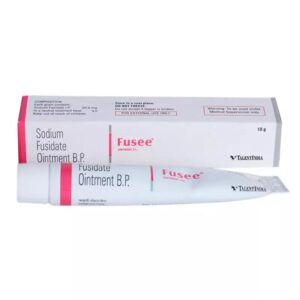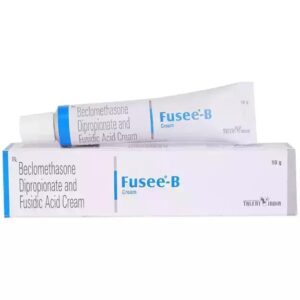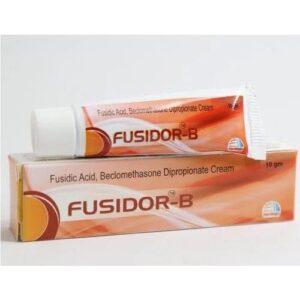FUSIDIC ACID + BECLOMETHASONE DIPROPIONATE
Fusidic Acid: Fusidic Acid is an antibiotic that is used to treat bacterial infections. It is commonly prescribed for skin and eye infections, such as impetigo and conjunctivitis.
The mechanism of action of Fusidic Acid involves inhibiting the synthesis of bacterial proteins by specifically targeting the protein synthesis elongation factor G (EF-G). By binding to EF-G, Fusidic Acid prevents the transfer of peptidyl-tRNA from the A site to the P site on the ribosome, disrupting the translation process and inhibiting bacterial growth.
The recommended dose of Fusidic Acid varies depending on the type and severity of the infection. For skin infections, it is typically applied topically in the form of cream or ointment, two to three times a day. In some cases, oral or intravenous formulations may be prescribed.
Common side effects of Fusidic Acid include skin irritation, allergic reactions, itching, redness, and burning at the application site. In rare cases, systemic side effects like diarrhea, nausea, and headache may occur. Prolonged or excessive use of Fusidic Acid may also lead to the development of antibiotic resistance.
It is important to note that Fusidic Acid may interact with certain medications, such as warfarin, leading to an increased risk of bleeding. Therefore, it is crucial to inform your healthcare provider about all the medications you are taking before starting Fusidic Acid treatment.
Beclomethasone Dipropionate: Beclomethasone Dipropionate is a synthetic steroid medication that belongs to a class of drugs called corticosteroids. It is primarily used as an inhaler for the prevention and control of asthma symptoms.
The main mechanism of action of Beclomethasone Dipropionate is through its anti-inflammatory properties. It reduces swelling and inflammation in the airways, making it easier for individuals with asthma to breathe. By decreasing inflammation, it also helps prevent asthma attacks.
The dose of Beclomethasone Dipropionate usually depends on the age and severity of the condition being treated. It is commonly administered through an inhaler, with the recommended starting dose typically ranging from 40 to 160 micrograms per day for adults and 40 to 80 micrograms per day for children. The actual dose may vary and should be determined by a healthcare professional.
While Beclomethasone Dipropionate is generally well-tolerated, it can have some potential side effects. Common side effects may include throat irritation, coughing, dry mouth, hoarseness, or a fungal infection in the mouth called thrush. Rarer side effects may include allergic reactions, skin rash, or difficulty breathing. It is important to discuss any concerns or potential side effects with a healthcare provider.



